Dental Casting Alloys
Question 1. Enumerate base metals used in dentistry. Describe the composition, advantages, and disadvantages of chromium-cobalt alloy as a denture base material.
Answer:
Base metals:
These are non-noble metals. They are important components of dental casting alloys because of their influence on physical properties, control of amount, type of oxidation, and their strengthening effects.
- Such metals are reactive with their environment and are referred to as “Base metals”.
- Some of the base metals can be used to protect an alloy from corrosion by a property known as “Passivation”.
- They are also called, “Non-precious metals”.
- Examples: Chromium, cobalt, nickel, iron, copper, manganese, etc.
Read And Learn More: Dental Materials Question And Answers
An alloy of Base metal is:
- Nickel: Chrome alloys.
- Cobalt-chromium alloys.
- Pure titanium and its alloys.
- Aluminum bronze alloys.
Cobalt-Chromium Alloy:
- They possess high strength; their excellent corrosion resistance especially at high temperatures makes it useful for a number of applications.
- These alloys are also known as “satellites” because of their shiny, star-like appearance.
- They have bright lustrous, hard, strong, and non-tarnishing qualities.
Uses Of Cobalt-Chromium Alloy:
- Denture base
- Cast removable partial denture framework
- Crown and bridges
- Bar connectors.
Composition Of Cobalt-Chromium Alloy:
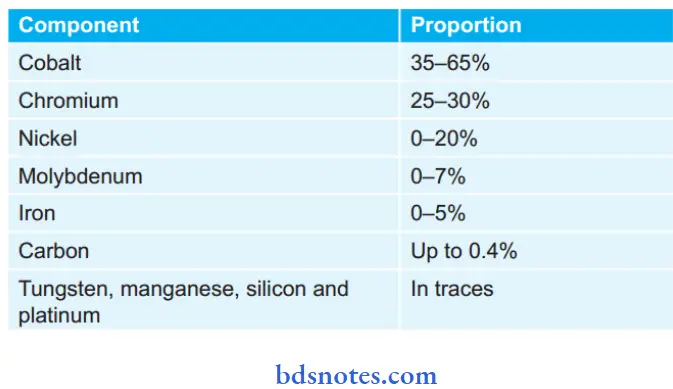
Functions of Alloying Elements:
- Cobalt:
- Increase the hardness, strength, and rigidity of the alloy.
- It has a high melting point.
- Chromium:
- Its passivating effect ensures corrosion resistance.
- It reduces the melting point.
- It also acts in solid solution hardening with other elements.
- Nickel:
- It decreases strength, hardness, modulus of elasticity, and fusion temperature.
- It increases ductility.
- Molybdenum, Tungsten, Iron, Copper:
- They are effective hardeners.
- Beryllium:
- Hardener and reduce fusion temperature and refine grain structure.
- Manganese and Silicon:
- Primarily oxide “scavengers” to prevent oxidation of other elements during melting.
- They also act as hardeners.
- Boron:
- Deoxidize and hardliner, but reduce ductility.
- Carbon:
- Carbon content is most critical in small amounts.
- It increases strength, hardness, and ductility.
- However, excess carbon increases brittleness.
Advantages Of Cobalt-Chromium Alloy:
- Lighter in weight.
- Better mechanical properties.
- Corrosion resistance due to the passivating effect of chromium.
- Less expensive than gold alloys.
Disadvantages Of Cobalt-Chromium Alloy:
- More techniques is sensitive.
- Complexity in the production of dental appliances.
- High fusion temperature.
- Greater casting shrinkage.
- Extremely hard thus cutting, grinding, and finishing is difficult so require special equipment for finishing.
- The high hardness can cause excessive wear of restorations and natural teeth contacting the restorations.
Question 2. Classify the denture base materials. How far does cobalt chromium alloy fulfill the requirements for a partial denture base?
Answer:
The material which is used for forming denture base is called “Denture base material”.
Classification of Denture Base Materials:
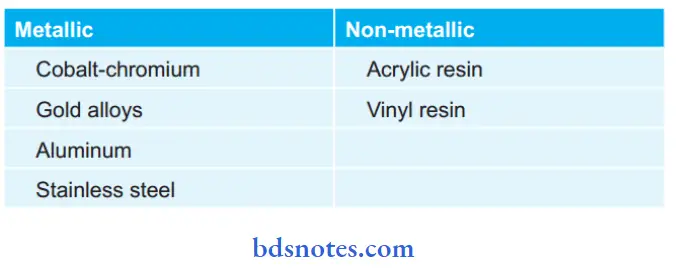
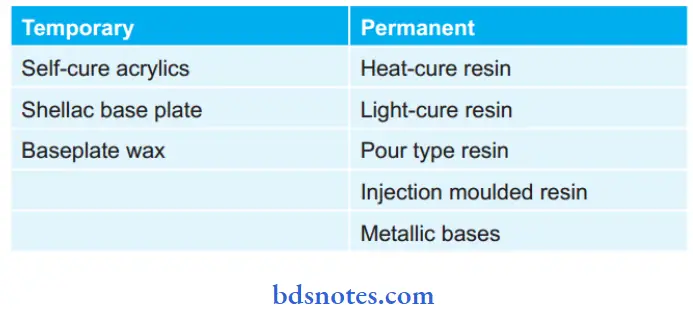
Cobalt-chromium Alloy is used as a Denture Base Material:
Cobalt-chromium alloy is the base metal alloy that is used for denture bases.
- They possess high strength: Their excellent corrosion resistance especially at high temperatures makes them useful for a number of applications.
- They are also known as “satellites” because of their shiny, star-like appearance.
Properties Of Denture Base Material:
The Cobalt-chromium alloys have replaced type IV gold alloys, especially for making cast partial RPDs because of their lower cost and good mechanical properties:
- The density is half that of gold alloys, so they are lighter in weight.
- Being a much larger structure the lighter weight aids in retention in the mouth.
- They are twice as stiff as gold alloys this aids in making the casting more thinner.
- This is important, especially in the palate region where having a thin palatal portion makes it more comfortable to the patients.
- The high stiffness prevents the frame from bending under occlusal forces.
- They have good fatigue resistance. This property is important for clasps.
- Clasps have to flux when inserted or removed from the mouth.
- If they do not have good fatigue resistance they break after repeated insertion and removal (less than gold).
- Less expensive than gold alloy, a large structure would require more metal therefore the cost of the alloy should be low.
- Tarnish and corrosion resistant because chromium forms a layer of chromium oxide on the surface of alloys and prevents tarnish and corrosion.
- This is called “passivation”.
Question 3. Classify casting gold alloys. Describe the composition, role of each constituent metal, and uses of casting gold alloys.
Answer:
Pure gold is a soft and ductile metal and so is not used for casting dental restorations and appliances.
Alloying gold with other metals not only improves its physical and mechanical properties but also reduces cost.
Classification of Casting Gold Alloy:
In 1932, the National Bureau of Standards surveyed and later by ADA specification no. 5 and the American National Standard Institute (ANSI) classified Gold Based Casting Alloys.
Depending on the Hardness:
- Type 1: Soft. VHN between 50–90 low strength.
- Type 2: Medium. VHN between 90–120 medium strength.
- Type 3: Hard. VHN between 120–150 high strength.
- Type 4: Extra hard. VHN between >150 extra high strength.
Type 1: Soft or low-strength alloys are used for castings subjected to very slightly less stress-bearing areas,
For example, Inlays. The minimum yield strength is 80 MPa and VHN 50-90 minimum percent elongation 18%.
Type 2: Medium-strength alloy is used for casting subjected to moderate stress, inlay, onlays, and full crowns.
This has a minimum yield strength of 180 MPa and varies from 90- 120 VHN and the minimum percent elongation is 10%.
Type 3: Hard strength for castings subjected to high stress For example, Onlays, thin copings, pontics, crowns, and saddles.
The minimum yield strength is 270 MPa, minimum percent elongation is 5%.
Type 4: Extra hard strength for castings subjected to very high stress.
- For example, Saddles, bars, clasps, thimbles, certain single units, and partial denture frameworks.
- Type 1 and Type 2 are called Inlay alloys while types 3 and 4 are called as crown and bridge alloys.
Depending on their Nobility:
- Noble
- Base metal
Depending on the Functions:
- Crown and bridge alloys
- Base metal alloys
- Removable partial denture alloys.
Based on the Color of the Alloy:
- Yellow gold alloy: Those with more than 60% of gold and those with low gold or economy gold with 42 to 55%.
- Gold has a yellow color, for example, Noble, high noble, predominantly base metals, and Japanese gold
- White gold alloy: Those with gold of more than 50% but palladium give white color.
Uses of Casting Gold Alloy:
- Inlays and Onlays
- Crowns and bridges
- Partial denture frames (only the type IV)
- Post and cores.
General Composition of Gold Alloy:
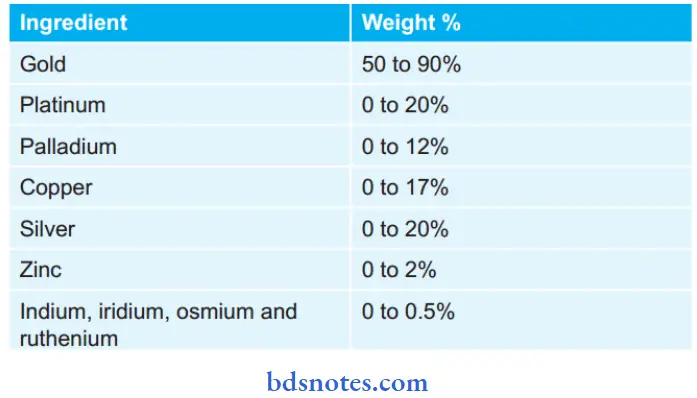
Composition of Gold Alloys based on Constituents:
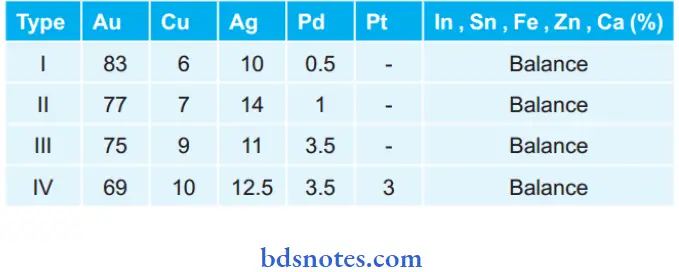
Function Of Each Element:
- Gold
- It provides tarnish and corrosion resistance and has a desirable appearance.
- Provides ductility and malleability.
- Copper:
- It is the principal hardener.
- It reduces the melting point and density of gold.
- In sufficient amounts, it provides a reddish color.
- It helps to age harden gold alloys.
- In greater amounts, it reduces resistance to tarnish and corrosion of gold alloy.
- Silver:
- It whitens the alloy thus helping to contrast the reddish color of copper.
- It increases strength and hardness.
- If large amount it may reduce tarnish and corrosion resistance.
- Platinum:
- It increases strength and corrosion resistance.
- It increases melting point.
- It has a whitening effect on the alloy.
- It helps to reduce grain size.
- Palladium:
- It hardens and whitens the alloy.
- It provides resistance.
- It reduces the cost of the alloy.
- It also raises fusion temperature.
- Zinc:
- It acts as a scavenger for oxygen.
- Without zinc, the silver in the alloy causes absorption of oxygen during melting and later during solidification.
- The oxygen is rejected producing gas porosities in casting.
- Indium, Tin, and Iron
- They all harden the alloy.
- Calcium:
- It compensates for the decreased coefficient of thermal expansion that results when the alloy is made silver-free.
- Iridium, Ruthenium, and Rhenium
- They help to decrease the grain size.
Question 4. Write a short note on the type of alloy used in dentistry.
Answer:
Alloy: An alloy is defined as a metal containing two or more elements, at least one of which is metal and all of which are mutually soluble in a molten state.
Uses of Alloy:
- Alloy is used for all metal and resin veneer restoration, for example, Inlays, posts, resin, and composite veneered, crowns, and bridges.
- Alloy for metal ceramic restoration, for example, PFM copings, PFM crowns, and bridges.
- Alloys for removable dentures, for example, RPD frames and complete denture bases.
Types of Alloys Used in Dentistry:
- According to use:
- Alloys for all metal and resin veneer restorations
- Alloys for metal ceramic restoration
- Alloys for removable dentures.
- Based on yield strength and percent elongation:
- Type I: Soft
- Type II: Medium
- Type III: Hard
- Type IV: Extra hard.
- According to nobility:
- High noble alloys—Contains ≥ 40wt% Au and ≥ 60 wt% of noble metals
- Noble metal alloys—Contains ≥ 25wt% of noble metals
- Predominantly base metal alloys—Contains ≥ 25wt% of noble metals
- Base metal.
- Based on mechanical properties:
- Type 0: Intended for low-stress bearing single-tooth fixed restorations, for example, mall veneered one surface inlays, veneered crowns.
- Type 1: Intended for low stress bearing single tooth fixed restorations, for example, Veneered or unveneered one surface inlays, veneered crowns.
- Type 2: Intended for single-tooth fixed restorations, for example, Crowns or inlays without restriction on a number of surfaces.
- Type 3: Intended for multiple unit-fixed restorations, for example, bridges
- Type 4: Intended for appliances with thin sections that are subjected to very high forces, for example, Removable partial dentures, clasps, thinly veneered crowns, wide span brides with small cross sections, bar, attachments, implant retained superstructures.
- Type 5: Intended for appliances in which parts require the combination of high stiffness and strength, For example, Thin removable partial dentures, parts with thin cross sections, and clasps.
- According to major elements
- Gold alloys
- Silver alloys
- Palladium alloys
- Nickel alloys
- Cobalt alloys
- Titanium alloys.
- According to three major elements:
- Gold–palladium–silver
- Palladium–silver–tin
- Nickel–chromium–molybdenum
- Cobalt–chromium–molybdenum
- Iron–nickel–chromium
- Titanium–aluminum–vanadium.
- According to a number of alloys present:
- Binary −Two elements
- Ternary − Three elements
- Quaternary − Four elements.
- According to the use of dental casting alloys:
- Alloys for all metal and resin veneer restorations:
- High noble
- Noble
- Predominantly base metal
- Base metal.
- Alloys for metal-ceramic restorations:
- High noble
- Noble
- Predominantly base metal
- Base metal.
- Alloys for casting large structures:
- High noble
- Noble
- Predominantly base metal
- Base metal.
- Alloys for all metal and resin veneer restorations:
Question 5. Write a short note on the heat treatment of gold alloy.
Or
Write a short note on the heat treatment of alloy.
Answer:
Heat treatment of alloys is done in order to alter their mechanical properties.
- Gold alloys can be heat-treated if it contains a sufficient amount of copper.
- Only type III and type IV gold alloy can be heat treated.
There are two types of heat treatment:
- Softening heat treatment.
- Hardening heat treatment.
- Softening Heat Treatment (Solution Heat Treatment): “Softening heat treatment increases ductility, but reduces strength, proportional limit and hardness.
- Indications: It is indicated for appliances that are to be ground, shaped, or otherwise cold worked in or outside the mouth.
- Method:
- The casting is placed in an electric furnace for 10 minutes at 700°C and then it is quenched in water.
- During this period, all intermediate phases are changed to a disordered solid solution.
- The rapid quenching prevents ordering from occurring during cooling.
- Hardening Heat Treatment (Age Hardening): “Hardening heat treatment increases strength, proportional limit, and hardness but decreases ductility”. Copper present in gold alloy helps in the age-hardening process.
- Indications: For strengthening metallic dentures, saddles, bridges, and other similar structures before use in the mouth.
- Method:
- It is done by “soaking” or aging the casting at a specific temperature for a definite time usually 15 to 30 minutes
- It is then water quenched or cooled slowly.
- The aging temperature depends on the alloy composition but is generally between 200°C to 450°C.
- During this period, the intermediate phases are changed to an ordered solid solution.
Question 6. Classify dental casting alloys. Give properties of each constituent.
Or
Describe briefly about types of alloys used in dentistry.
Answer:
Alloy: An alloy is defined as a metal containing two or more elements at least one of which is metal and all of which are mutually soluble in the molten state.
Classification of Dental Casting Alloys:
- According to use:
- Alloy for all metal and resin veneer restorations.
- Alloys for metal ceramic restoration
- Alloys for removable dentures.
- According to yield strength and percentage elongation:
- Type I: Soft
- Type II: Medium
- Type III: Hard
- Type IV: Extra hard.
- According to nobility:
- High noble metal alloy − containing >40% Au and > 60 wt. % of noble metals.
- Noble metal alloys − contain>25 wt % of noble, metals.
- The predominantly base metal alloy contains— < 25 wt % of noble metals.
- According to major elements:
- Gold alloy
- Silver alloy
- Palladium alloy
- Nickel alloy
- Cobalt alloy
- Titanium alloys.
- According to three major elements:
- Gold-palladium- silver
- Palladium-silver-tin
- Nickel-chromium-molybdenum
- Cobalt-chromium-molybdenum
- Iron-nickel-chromium
- Titanium-aluminium-vanadium.
- According to a number of alloys present:
- Binary—two elements
- Ternary—three elements
- Quaternary—four elements.
Question 7. Write briefly on the classification of casting gold alloys.
Or
Write a short note on the classification of casting gold alloys.
Answer:
Classification of Casting Gold Alloys:
In 1932, the National Bureau of Standards surveyed and later by ADA specification no. 5 and the American National Standard Institute (ANSI) has classified Gold Based Casting Alloys.
Depending on the Hardness:
- Type 1: Soft. VHN between 50–90 low strength.
- Type 2: Medium. VHN between 90–120 medium strength.
- Type 3: Hard. VHN between 120–150 high strength.
- Type 4: Extra hard. VHN between >150 extra high strength.
Type 1: Soft or low-strength alloys are used for castings subjected to very slightly less stress-bearing areas.
For example, Inlays. The minimum yield strength is 80 MPa and VHN 50-90, minimum percent elongation is 18%.
Type 2: Medium-strength alloy is used for casting subjected to moderate stress.
- For example, Inlay, onlays, and full crowns.
- This has a minimum yield strength of 180 MPa and varies from 90-120 VHN, and the minimum percent elongation is 10%.
Type 3: Hard strength for castings subjected to high stress.
- For example,onlays, thin copings, pontics, crowns,s and saddles.
- The minimum yield strength is 270 MPa, minimum percent elongation is 5%.
Type 4: Extra hard strength for castings subjected to very high stress.
For example, Saddles, bars, clasps, thimbles, certain single units, and partial denture frameworks.
Type 1 and 2 are called as Inlay alloys while Type 3 and 4 are called crown and bridge alloys.
Depending on their Nobility:
- Noble
- Base metal.
Depending on the Functions
- Crown and bridge alloys
- Base metal alloys
- Removable partial denture alloys.
Based on the Color of the Alloy:
- Yellow gold alloy: Those with more than 60% gold and those with low gold or economy gold with 42 to 55% gold have a yellow color,
- For example, Noble high noble, predominantly base metals, and Japanese gold
- White gold alloy: Those with gold of more than 50% but palladium give a white color
Question 8. Write briefly on base metal alloys.
Or
Write short notes on base metal alloys.
Answer:
Base metal refers to the metal elements that are chemically reactive to their environment.
- Base metal alloys are those which contain little or no noble metals.
- The first base metal alloys were cobalt-chromium alloys primarily used for removable partial denture alloys.
- Later on, nickel-chromium alloys were used and recently titanium and its alloys are used.
Cobalt-Chromium Alloys:
- Cobalt-chromium alloys were the oldest and possess high strength.
- They have the best corrosion resistance at high temperatures which makes these alloys useful for many applications.
- Cobalt-chromium alloys have a shiny, star-like appearance.
- They are bright, lustrous, hard, strong, and have non-tarnishing qualities.
Uses Of Cobalt-Chromium Alloys:
- In denture base
- In casting removable partial denture framework
- In crowns and fixed partial dentures
- Bar connectors.
Composition Of Cobalt-Chromium Alloys:
- Cobalt − 35 to 65%
- Chromium − 23 to 30%
- Nicke − 0 to 20%
- Molybdenum − 0 to 7%
- Iron − 0 to 5%
- Carbon − Upto 0.4%
- Tungsten, manganese, silicon, and platinum − Traces.
Functions of Alloy Elements:
- Cobalt: Provide hardness, strength, and rigidity. Has a high melting point.
- Chromium: Gives corrosion resistance and helps in the reduction of melting point.
- Nickel: Increases ductility and decreases modulus of elasticity, strength, hardness, and fusion temperature.
- Molybdenum: Acts as hardener, and reduces ductility.
- Iron, copper, and beryllium: These are hardliners, beryllium decreases fusion temperature and refine grain structure.
- Manganese and Silicon: Prevent oxidation of other elements during melting.
- Boron: Harder and reduces ductility.
- Carbon: Strengthen the alloy.
Properties Of Cobalt-Chromium Alloys:
- Density: Light in weight, i.e. 8 to 9 g/cm3
- Fusion temperature: It is high 1250°C to 1480°C.
- Yield strength: It is 710 MPa.
- Elongation: It is 1 to 12%.
- Modulus of elasticity: Their stiffness is twice the stiffness of gold alloys.
- Hardness: Very hard compared to gold alloys. Cutting, grinding and finishing are difficult.
- Casting shrinkage: It is high almost 2.3%.
Nickel-Chromium Alloys:
Composition Of Nickel-Chromium Alloys :
- Basic Elements:
- Nickel–61 to 81 wt%
- Chromium–11 to 27 wt%
- Molybdenum–2 to 9 wt%.
- Minor Elements:
- Beryllium–0.5 to 2 wt%
- Aluminium–0.2 to 4.2 wt%
- Iron–0.1 to 0.5 wt%
- Silicon–0.2 to 2.8 wt%
- Copper–0.1 to 1.6 wt%
- Manganese–0.1 to 3 wt%
- Cobalt–0.4 to 0.5 wt%
- Tin–1.25 wt%.
Properties Of Nickel-Chromium Alloys :
- The color is white.
- Density: Light in weight, i.e. 7.8 to 8.4 g/cm3
- Yield strength: It is 310 to 828 MPa.
- Modulus of elasticity: It is 150-218 GPa.
- Casting shrinkage: It is high.
- Melting range: It is 1155 to 13040C.
- Hardness: Hardness ranges from 175 to 360 VHN.
- Sag resistance: It is high, i.e. materials are stable at firing temperatures.
- Tarnish and corrosion resistance is high because of passivation.
- Biological Consideration: Nickel can lead to allergic reactions. It can be a potent carcinogen.
Titanium and its Alloys:
- Uses Of Titanium and its Alloys:
- As dental implant
- As metal-ceramic restoration
- A complete denture base
- As a partial denture frame
- As bar connectors.
Properties Of Titanium and its Alloys
- The color is white.
- Density: Light in weight, i.e. 4.5 g/cm3
- Yield Strength: It is 460 to 600 MPa.
- Tensile strength: It is 560 to 680 MPa.
- Modulus of elasticity: It is 110 GPa.
- Melting range: It is 1668°C.
- Tarnish and corrosion resistance is high because of self-passivation.
- Biological Consideration: Excellent biocompatibility
Advantages of Base Metal Alloys:
- They are lighter in weight.
- Mechanical properties are good.
- They are corrosion-resistant because of the passivating effect.
- They are cheaper.
Disadvantages of Base Metal Alloys:
- They are technique-sensitive.
- Their fusing temperatures are high.
- They are hard and require special equipment for finishing.
Question 9. Write a short note on the Properties of Gold Alloy.
Answer:
Properties of Gold Alloy:
- Color: The color of modern gold alloys can vary from gold to white. Color depends on the amount of whitening materials.
- Melting Range: It is 920 to 960°C. The melting range indicates the type of investment required and the type of heating source needed to melt the alloy.
- Density: Density provides the clue that a number of dental castings which are made from a unit weight of metal. By density castability of the alloy is decreased.
- Alloys with higher density should be cast better than low-density alloys.
- The density for type III is 15.5 g/cm3
- The density for type IV is 15.2 g/cm3
- Yield Strength
- For type III it is 207 MPa
- For type IV it is 275 MPa.
- Hardness: It shows that how easily alloys can be cut, grounded, and polished. Gold alloys are better as compared to base metal alloys.
- For type III it is 121 MPa
- For type IV it is 149 MPa.
- Modulus of Elasticity: This property indicates the stiffness or flexibility of metal. Gold alloys are more flexible.
- Tarnish and Corrosion Resistance: Gold alloys are resistant to tarnish as well as corrosion. This is because gold has a high noble metal content.
- Casting Shrinkage: In gold alloys casting shrinkage is less as compared to base metal alloys. It ranges from 1.25 to 1.65%.
- Biocompatibility: Gold alloys are biocompatible.
- Casting Investment: Low-fusing gold alloys use gypsum-bonded investments.
Question 10. Write a short note on the ideal requirements of dental casting alloys.
Answer:
Ideal Requirements of Dental Casting Alloys:
According to ADA specification number 5, the requirements of dental casting alloys are:
- Biocompatibility: It must be non-toxic, non-irritant, and non-carcinogenic. It must tolerate oral fluids and not release any harmful products into the oral environment.
- Corrosion resistance: Corrosion is a physical dissolution of a material in an environment. This is mainly due to the passivating surface film of chromium in nickel-chromium and cobalt-chromium alloys and also due to titanium in commercially pure titanium and Ti − 6Al – 4V alloys.
- Tarnish resistance: Tarnish is a thin form of surface deposit or an interaction layer that is adherent to the metal surface.
- The allergic component in alloys: It should not cause adverse health consequences during fabrication and subsequent usage.
- Esthetics.
- Thermal properties: It must have closely matching thermal expansion to be compatible with given porcelain and also must tolerate high processing temperatures.
- Melting range: It must be low enough to form a smooth surface with mold walls of casting investment. It possesses good fluidity when molten during casting.
- Compensation for casting solidification: Casting shrinkage from the solidus temperature to room temperature is achieved through either computer-generated oversized dies or through controlled mold expansion. Also, fi of a cemented prosthesis must be tailored to accommodate the layer of bonding adhesive or cement.
- Strength requirement: Must have sufficient strength and also sufficiently ductile and resilient according to application. The fabrication of cast prosthesis and framework and the ease with which the material is fabricated determines its ultimate success.
- Castability: Molten metal must be able to get the investment mold material and also flow into the most intricate region without any appreciable interaction and forming porosities. Castability should be with minimum or zero percent shrinkage.
- Finishing of cast metal: It should possess sufficient hardness for grinding and finishing so as to produce a satisfactory surface finish of the restoration.
- Porcelain bonding: To have a sound chemical bond to ceramic veneering material, a substrate metal must be able to form a thin adherent oxide and it should interfere with the aesthetic potential of the ceramic.
- Economy: It should be economical
- Dimensionally stable.
- Ease of laboratory work and soldering.
Question 11. Write a short note on sensitization and stabilization.
Answer:
Sensitization:
- It is the loss of corrosion resistance of 18-8 stainless steel by removal of the chromium layer when heated.
- At temperatures between 400 and 900°C during the soldering and welding of orthodontic appliances.
- This occurs because chromium combines with carbon to form chromium carbides during heating.
- Thus, the passivating effect of the chromium oxide layer is lost resulting in loss of corrosion resistance.
Stabilization:
- Titanium, niobium, or tantalum is added six times more than carbon.
- So titanium reacts with carbon and protects the chromium oxide.
- Care should be taken not to create rough surfaces on wires and they should be kept away from chlorine

Leave a Reply